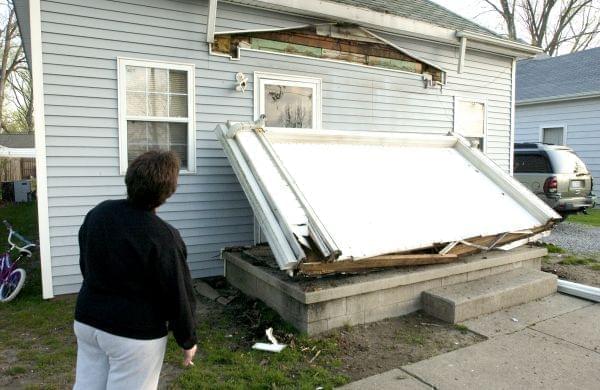ENCORE: Midwest Earthquakes; Conspiracy Theories And Politics; Dealing With Burnout

Janet Clem, 37, looks at the damage to her home in Mt. Carmel, Ill. on April 18, 2008 from an early morning earthquake. The 5.2 magnitude earthquake, centered in southern Illinois, rattled skyscrapers in Chicago's Loop and homes in Cincinnati but appeared to cause no major injuries or damage. Daniel R. Patmore/AP
On this special Labor Day encore episode, we talked about one of the largest earthquakes recorded in the US that happened in the Midwest in 1811. So how likely are earthquakes in the Midwest today? Plus, conspiracy theories have been part of our politics for a long time. These days, belief in those theories are part of why our country is so divided. We learned how that happened. Also, what’s the difference between feeling stressed and experiencing burnout? And, how can understanding that difference help challenge stigma around mental health?
Midwest Earthquakes
Residents near Cleveland were probably surprised on June 10 when a 4.2 magnitude earthquake rattled Northeast Ohio. According to the US Geological Survey, an earthquake of that magnitude is noticeable but doesn’t cause much damage at all.
It’s a good reminder, though, that earthquakes do happen in the Midwest. In fact, geologists say large, damaging earthquakes have occurred in the Midwest in the past and are expected again.
In 1811 and 1812, there were a series of earthquakes in the middle of the country known as the New Madrid earthquakes — some of the largest in American history. They were so strong that for a short time, they changed the direction the Mississippi River flowed.
Conevery Valencius, a history professor at Boston College, wrote a book about the New Madrid quakes. Tim Larson, Senior Geophysicist with the Illinois State Geological Survey, joined us in the studio to talk about what might be going on under our feet here in Illinois and the risk of earthquakes in our region.
Conspiracy Theories And Politics
American politics has had no shortage of its conspiracy theories. Think about questions about Who Shot JFK? Or Area 51.
But in the past few years it’s easy to name so many more: pizzagate, birthers, the death of Vince Foster. At the same time, our politics have become so much more polarized.
So, University of Chicago Political Scientist Eric Oliver has asked, could the force driving conspiracy theories also be the same one that’s dividing our country? He joined us on the line to talk about his research.
Dealing With Burnout
Many of us have experienced a feeling of being burnt out: a long week at work or at home can leave us feeling exhausted, both physically and emotionally. But when does every day stress turn into something more serious?
Now, the World Health Organization has changed and clarified the definition of burnout and separated it from other stress syndromes. Researchers hope the change will bring more awareness and more options for treatment.
Samantha Coleman is a professor in industrial and organizational psychology at Adler University in Chicago.

